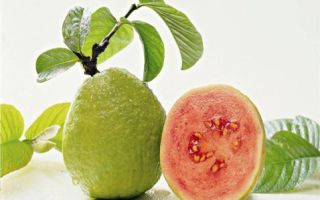Content
- 1 What does passion fruit look like and where does it grow
- 2 Composition and calorie content of passion fruit
- 3 Why passion fruit is useful for the body
- 4 The benefits of passion fruit for weight loss
- 5 The use of passion fruit in traditional medicine
- 6 Passion fruit in home cosmetology
- 7 How to eat passion fruit
- 8 What can be cooked from passionfruit
- 9 Passion fruit harm and contraindications
- 10 How to choose and store passion fruit
- 11 Conclusion
With the development of transport links, it became possible to bring various exotic fruits of African and South American plants to European countries. One of them is passion fruit, in science called edible passion flower, granadilla and edible passion flower. The benefits and harms of passion fruit are determined by the chemical composition of the pulp of its fruits, the presence of biologically active substances with useful properties, minerals and dietary fiber.
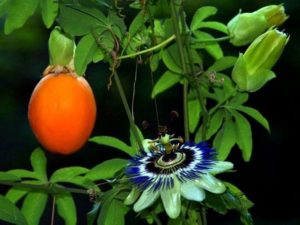
What does passion fruit look like and where does it grow
Today, the passion fruit, whose homeland is the South American continent, is intensively cultivated in Israel, Macaronesia, New Zealand and Hawaii. You can find passion fruit plantations in the Galapagos and Sri Lanka.
It is a large evergreen liana that grows in tropical conditions, with beautiful 3 cm flowers and dark green curly leaves with jagged edges.

The benefits and harms of passion fruit for the human body are considered in relation to its fruits - spherical or oblong fruits, depending on the type, having a wide range of colors: from bright yellow to dark purple.
Ripe passion fruit has a slightly soft core, slightly wrinkled peel (possibly with small cracks), small size. The presence of juice makes the healthy fruit heavy.
Passion fruit peel is dense and thick, reliably retaining the internal smell. There is practically no benefit in it, its botanical property is to protect the pulp to maintain the viability of the seeds.
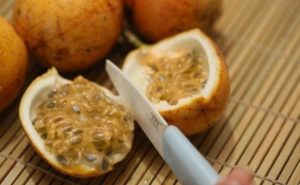
In some species of passion fruit, the peel is considered poisonous, unsuitable for food, capable of harming the body. However, there are many useful varieties.
Composition and calorie content of passion fruit
Passion fruit pulp is a real treasure of health. It contains a lot of nutrients:
- minerals;
- vitamins;
- alimentary fiber;
- fructose.
Useful minerals are represented by both micro and macro elements.
Passion fruit is not low-calorie. 100 g contains 68 kcal, which makes it a complete source of energy for people with an active lifestyle.
Selected in passionfruit juice serotonin - a substance that strengthens the strength of the spirit, regulates mood, softens the effects of stress. This is an especially useful property during physical and mental stress, when living conditions change.
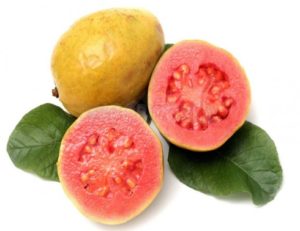
Vitamins
The value and benefit of the vitamin composition is explained by the presence of vitamins C, PP, K, A, E, group B in passion fruit.
In addition to the benefits of admission vitamin C (increasing immunity, launching regenerative processes, strengthening muscles, antioxidant activity), passion fruit are valued for the content of vitamin E - a famous guardian of beauty. With the help of its properties, the aging of the body is inhibited, the skin heals, the hair is strengthened, and the resistance to environmental harm rises.
Vitamin A in passion fruit helps to slow down the deterioration of vision, improve the functioning of the endocrine glands. Thanks to B vitamins, important chemical reactions are intensified that support metabolic processes at any level, for example, B6 regulates digestive processes, has a positive effect on mental activity, and benefits in the process of hematopoiesis.
The beneficial properties of vitamin K improve blood characteristics (regulate the coagulation factor).
Minerals
The most important minerals contained in passion fruit are iron, copper, zinc, potassium, phosphorus, calcium, fluorine, sulfur. Using the calcium present in the pulp, a person strengthens the musculoskeletal system, with the help of potassium it stabilizes phosphorus-calcium metabolism, sulfur improves the nutrition of skin and hair cells.
Iron, a well-known helper for health, is involved in hematopoietic processes.
Passion fruit is highly valued for the content of iodine - a useful element for the functions of the thyroid gland.
The benefits of the intake of copper, fluoride and zinc - natural minerals involved in the synthesis of hormones, enzymes, hematopoiesis and strengthening of muscle fibers - are not exaggerated.
The properties of an active participant in carbohydrate and lipid metabolism - manganese - help the absorption of vitamins and microelements, and sodium is involved in the transport of substances into tissue cells.
Why passion fruit is useful for the body
Because of its rich biochemical composition, passion fruit is useful for almost any organism. True, you should not use it in unlimited quantities, so as not to cause allergies and thereby not harm the body.
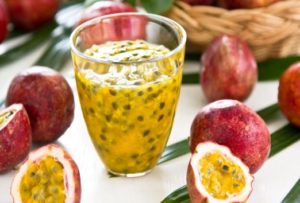
The health benefits and harms of passion fruit are based on its chemical composition, thanks to which it is possible not only to strengthen the body, but also to treat the symptoms of certain diseases, to prevent pathologies, and to help preserve one's youth and attractiveness.
The main health benefits come from passion fruit pulp. Due to the wide range of components it contains, the use will help:
- cope with intestinal and stomach cramps;
- normalize stool;
- restore the body's defenses after an illness;
- improve metabolism;
- overcome hyperthermia;
- relieve muscle pain after significant physical exertion;
- normalize temporary surges in blood pressure;
- strengthen the cardiovascular system;
- improve eyesight.
In addition, passionfruit is a delicious and pleasant fruit that gives a comfortable tonic effect, quenching thirst. Its juice can be mixed with other juices or taken on its own.
The benefits of passion fruit for weight loss
Due to the fact that the calorie content of passionfruit is 68 kcal per 100 products, and the amount of fat is practically zero, it is included in diets for losing weight, keeping weight at constant numbers that do not harm the body.
The beneficial properties of passion fruit in matters related to dietary nutrition combine a rich biochemical composition and a low calorie content. The body does not get a reason to gain weight with the stability of the chemical and physiological composition of its internal environment, and the harm from the side effects of passion fruit is minimized.
The use of passion fruit in traditional medicine
In folk medicine, the beneficial properties of passion fruit leaves and seeds are widely used. Their inclusion in the composition of medicinal products is an enhancement of the homeopathic component, the natural direction of the drug's action without harm to other organs or systems.
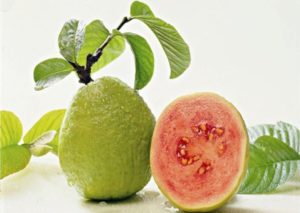
Passion fruit leaves have beneficial properties of soothing pain and calming the nervous system. They contain passionflower, which gently and effectively helps both adults and children to relax and fall asleep.
The use of passionfruit leaf extract is due to their ability to heal bruises, normalize intestinal disorders, and soothe pain during menstruation.
Passion fruit peel is no exception. It contains a significant amount of vitamin C, the properties of which are beneficial in strengthening the body.
Passion fruit in home cosmetology
The benefits of passion fruit for women are not limited to taking it internally. Due to the rich content of fatty oil obtained from the fruit, the properties of passion fruit are often used in cosmetology. Passion fruit oil is rich in essential acids, vitamins, antioxidants. Its benefits in the fight against problem skin of the face, hyperfunction of the sebaceous glands, early aging is enormous.
The beneficial properties of creams, lotions, foams, and face masks prepared on such an oil basis give an anti-inflammatory effect, revitalize tired skin, fight against an increased tendency to fat formation, nourish and saturate it with health.
Face masks
The beneficial properties of passion fruit for the face are due to the oils included in the seeds. They contain vitamins, carotenoids, bioflavonoids, unsaturated fatty acids in abundance.
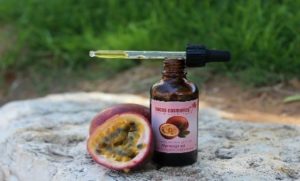
- For the purpose of lifting, it is recommended to prepare a mask: take the pulp of passionfruit, banana in equal amounts, add half this dose of almond oil and starch. Mix everything well and apply to cleansed skin.
- A refreshing vitamin mask is made from 3 tablespoons of passionfruit, 1 - avocado, 1 teaspoon of oatmeal and honey.
- For a whitening effect, mix 10 g of passionfruit oil, a tablespoon of pure yogurt and a teaspoon of parsley juice.
Hair masks
Passion fruit oil has a beneficial effect on hair. Its benefit lies in restoring their damaged structure, giving shine, facilitating combing, normalizing the processes of sebum formation, combating the section of the tips and their breaking off.
Passion fruit oil is included in many masks. An interesting so-called Brazilian version: mix in equal parts passionfruit oil, rice, acai. In a heated form, apply to the hair roots and distribute throughout the entire volume. To increase the effect, put on an insulating cap.
It is also recommended to simply rub passionfruit oil into your hair during the upcoming drying with an electric hair dryer or for a long stay under the scorching sun. It will protect the structure from overheating and prevent it from drying out.
How to eat passion fruit

Only passionfruit pulp is eaten. Therefore, it is important to get it out carefully and as completely as possible. For this, the passionfruit peel is slightly cut with a knife, then broken in half, after which the contents are eaten with a spoon.
If you decide to cook a dish with passionfruit, mix its pulp with the selected ingredients and arrange in portions.
Do passionfruit seeds eat
Passion fruit pulp is eaten together with seeds. According to nutritionists, they increase the adsorption properties of food and promote intestinal motility.
What can be cooked from passionfruit
The exotic taste of passionfruit, juiciness and beneficial nutritional properties aroused interest among culinary experts and simply lovers of cooking something delicious.
Among these recipes are desserts made on the basis of passion fruit:
- passion fruit with whipped cream;
- egg cream with passionfruit;
- jelly and ice cream with passionfruit;
- fruit cake with passionfruit.

Passion fruit harm and contraindications
Along with the tremendous benefits, passion fruit can harm human health. First of all, this applies to those who are characterized by intestinal poisoning, indigestion, bloating and diarrhea.
In people with a tendency to allergic reactions, food manifestations of intolerance to one or more components of passion fruit juice are possible.
The benefits of passion fruit for pregnant women are obvious.However, women should not start taking passion fruit in order to avoid harm if, before pregnancy, her intestines were not familiar with the fruit.
In view of the fact that passionfruit is capable of having a slight diuretic effect, as well as weakening the stool and disposing to increased bowel movements, one should be careful of those who already have a similar pathology.
It is recommended to introduce passion fruit into the children's diet starting from the age of 3, since it is quite complex for the child's food system and can harm an unformed body.
Patients with diabetes should use passion fruit with caution.
How to choose and store passion fruit
A fresh, ripe passionfruit has a slightly wrinkled skin and feels soft when pressed. You can shake the fruit a little. You will feel the movement of the overflowing liquid under your hand. This juice is delicious, healthy and refreshing.
Passion fruit should not be light and hard. This is evidence of its drying out or immaturity. In both cases, passionfruit contains very little useful properties, but damage to the digestive system can be significant.
Conclusion
The benefits and harms of passion fruit is an interesting question that worries connoisseurs of exotic. Passion fruit is a treat that nature itself has prepared. Its benefits are worthy of bringing fruits from distant countries, and the rich, bright taste has made small fruits a favorite treat for many Europeans.

